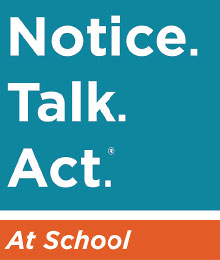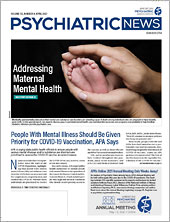When Craig High School in Rock County, Wis., was still holding classes in person, Robert Ward, a personal finance teacher at the school, had a student who was really engaged at the beginning of the semester. Then, without warning, he noticed the student starting to fall asleep in class.
“I reached out to the parents, and then, when we started distance learning, I found out from the parents that the student was having some mental health issues,” Ward said.
Ward had completed training with the APA Foundation’s Notice. Talk. Act. at School program, and he felt comfortable talking with the student. “I said, ‘I understand what you are experiencing, and we can work together to take care of the work you missed when we moved to distance learning,’ ” Ward said. “The student was overwhelmed because when we started distance learning, it was hard to find motivation after having already fallen behind. It was the mentality of, ‘I’m never going to catch up, so why should I even try?’ But we ended up working on it slowly together, and the student did much better.”
Programs like Notice. Talk. Act. at School are more important than ever this year, as schools across the country have been forced to teach students virtually. Experts have warned that the return to in-person learning may be emotionally difficult for many students (
Psychiatric News). But schools that have already implemented the program say that it has been immensely helpful at educating teachers to identify students in need and connect with them.
Rock County has one of the highest adverse childhood experiences (ACEs) scores in the state, according to Alison Bjoin, Ed.D., principal of Craig High School. “Because of the need in our school and in the community, it seemed we needed a program like this,” Bjoin said.
Craig High School implemented Notice. Talk. Act. at the beginning of the 2019-2020 school year. For students who are feeling isolated or unsure about whom they can talk to, having a school staff member reach out and take the extra step to connect can make a huge difference, Bjoin said.
In Virginia, Stafford County Public Schools’ H.H. Poole Middle School and Dixon-Smith Middle School also introduced Notice. Talk. Act. to the school staff at the start of the 2019-2020 school year.
Lisa Arthur, a focus resource teacher at Dixon-Smith, put what she learned through Notice. Talk. Act. into action when a student ran away. “We’d get hit-or-miss responses: The student would reply to me about school but wouldn’t talk to me about things going on socially, and then would respond to the case manager about social issues,” Arthur said. “So we managed to pull from all those different angles and get the student home. It really does take a village.”
Arthur has used what she learned during her Notice. Talk. Act. training this year for virtual learning, as well. For example, when she noticed a student’s behavior was deviating from the norm, she tried talking with the student and the parents, then ultimately reached out to the counseling office.
“The training helped us become a little more enlightened and aware about what’s going on with some of our students,” Arthur said. “It’s helped us notice those little signs that we may have overlooked before.”
“Having a relationship with a trusted adult helps students talk about what they’re experiencing,” said Melissa Rinker, M.S.W., the social worker at H.H. Poole Middle School. “Our teachers are in school to teach, but educating them about mental health awareness and how to start those conversations haveempowered them.”
The program has created a lot more awareness among school staff of the mental health services available, explained Elsa Garcia-Sanda, L.C.S.W., coordinator and psychiatric social worker at the Los Angeles County Office of Education. The county office implemented Notice. Talk. Act. at three of the schools it operates at the start of the 2020-2021 school year. “We have people thinking more about early intervention, and with the pandemic going on, especially, that’s huge,” she said. “People feel like their hands are tied, so reassuring them that there are actionable steps they can take to help students is just what they need.”
“The training allows us to show these students that our most important job is helping them,” Ward said. “When they see that human side of us through Notice. Talk. Act., they learn that people care, and that can lead to better learning because now they feel safe, secure, and loved.” ■
Psychiatrists play a vital role in the Notice. Talk. Act. at School program by delivering the curriculum and sharing their expertise with school staff.
More information is posted
here.

